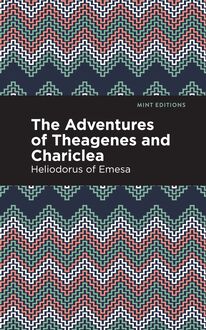-
 Univers
Univers
-
 Ebooks
Ebooks
-
 Livres audio
Livres audio
-
 Presse
Presse
-
 Podcasts
Podcasts
-
 BD
BD
-
 Documents
Documents
-
- Cours
- Révisions
- Ressources pédagogiques
- Sciences de l’éducation
- Manuels scolaires
- Langues
- Travaux de classe
- Annales de BEP
- Etudes supérieures
- Maternelle et primaire
- Fiches de lecture
- Orientation scolaire
- Méthodologie
- Corrigés de devoir
- Annales d’examens et concours
- Annales du bac
- Annales du brevet
- Rapports de stage
La lecture à portée de main
Vous pourrez modifier la taille du texte de cet ouvrage
Découvre YouScribe en t'inscrivant gratuitement
Je m'inscrisDécouvre YouScribe en t'inscrivant gratuitement
Je m'inscrisEn savoir plus
Vous pourrez modifier la taille du texte de cet ouvrage
En savoir plus

Description
The Love of Daphnis and Chloe (2nd century C.E.) is an ancient Greek romance novel by Longus. Set on Lesbos, it is a classic story of love set in a recognizably pastoral setting. An important early novel and a landmark in the development of Western literature, The Love of Daphnis and Chloe has inspired and influenced such wide-ranging artists as Jean-Jacques Rousseau, Allan Ramsay, Marc Chagall, Colette, and Yukio Mishima.
Abandoned at birth, Daphnis is raised by a goatherd named Lamon on the island of Lesbos. Chloe, likewise abandoned, is raised by Dryas, a nearby shepherd. Living and working in the fields of their native land, the two become fast friends, frequently spending time together while herding their respective flocks. As they fall in love, with no model for romantic affection, Daphnis and Chloe struggle to understand their mutual feeling. Seeking the guidance of a wise cowherd, they are advised to share a kiss with one another, for only a kiss will cure their growing sickness. All too trusting, they follow the cowherd’s instruction, only to be plunged into deeper desire. Still unsure of how to show his affection, Daphnis journeys to the city, where an older woman educates him in the ways of love. Meanwhile, Chloe is kidnapped and taken to a faraway kingdom. Fearing the worst, Daphnis embarks on a journey to save her, facing pirates, pitfalls, and countless other dangers on his way. The Love of Daphnis and Chloe is not only a groundbreaking work of prose fiction, but a widely adapted model of classical romance that continues to be read and appreciated nearly two millennia after its publication.
With a beautifully designed cover and professionally typeset manuscript, this edition of Longus’s The Love of Daphnis and Chloe is a classic of ancient Greek literature reimagined for modern readers.
Sujets
Informations
| Publié par | Mint Editions |
| Date de parution | 02 mars 2021 |
| Nombre de lectures | 0 |
| EAN13 | 9781513276953 |
| Langue | English |
| Poids de l'ouvrage | 1 Mo |
Informations légales : prix de location à la page 0,0300€. Cette information est donnée uniquement à titre indicatif conformément à la législation en vigueur.
Extrait
The Love of Daphnis and Chloe
Longus
The Love of Daphnis and Chloe was first published in 1559.
This edition published by Mint Editions 2021.
ISBN 9781513271958 | E-ISBN 9781513276953
Published by Mint Editions®
minteditionbooks.com
Publishing Director: Jennifer Newens
Design & Production: Rachel Lopez Metzger
Project Manager: Micaela Clark
Translated by Rowland Smith
Typesetting: Westchester Publishing Services
C ONTENTS B OOK I B OOK II B OOK III B OOK IV
Book I
I n the island of Lesbos there is an extensive city called Mitylene, the appearance of which is beautiful; the sea intersects it by various canals, and it is adorned with bridges of polished white stone. You might imagine you beheld an island rather than a city.
About twenty-four miles from Mitylene, were the possessions of a rich man, which formed a very fine estate. The mountains abounded with game, the fields produced corn, the hills were thick with vines, the pastures with herds, and the sea-washed shore consisted of an extent of smooth sand.
As Lamon, a goatherd, was tending his herds upon the estate, he found a child suckled by a she-goat. The place where it was lying was an oak coppice and tangled thicket, with ivy winding about it, and soft grass beneath; thither the goat continually ran and disappeared from sight, leaving her own kid in order to remain near the child. Lamon watched her movements, being grieved to see the kid neglected, and one day when the sun was burning in his meridian heat he follows her steps and sees her standing over the infant with the utmost caution, lest her hoofs might injure it, while the child sucked copious draughts of her milk as if from its mother’s breast. Struck with natural astonishment, he advances close to the spot and discovers a lusty and handsome male-child, with far richer swathing clothes than suited its fortune in being thus exposed; for its little mantle was of fine purple, and fastened by a golden clasp, and it had a little sword with a hilt of ivory.
At first Lamon resolved to leave the infant to its fate, and to carry off only the tokens; but feeling afterwards ashamed at the reflection, that in doing so, he should be inferior in humanity, even to a goat, he waited for the approach of night, and then carried home the infant with the tokens, and the she-goat herself to Myrtale his wife.
Myrtale was astonished, and thought it strange if goats could produce children, upon which her husband recounts every particular; how he found the infant exposed; how it was suckled; and how ashamed he felt at the idea of leaving it to perish. She shared his feelings, so they agreed to conceal the tokens, and adopt the child as their own, committing the rearing of it to the goat; and that the name also might be a pastoral one they determined to call it Daphnis.
Two years had now elapsed, when Dryas, a neighbouring shepherd, tending his flock, found an infant under similar circumstances.
There was a grotto sacred to the Nymphs; it was a spacious rock, concave within, convex without. The statues of the Nymphs themselves were carved in stone. Their feet were bare, their arms naked to the shoulder, their hair falling dishevelled upon their shoulders, their vests girt about the waist, a smile sat upon their brow; their whole semblance was that of a troop of dancers. The dome of the grotto rose over the middle of the rock. Water, springing from a fountain, formed a running stream, and a trim meadow stretched its soft and abundant herbage before the entrance, fed by the perpetual moisture. Within, milk-pails, transverse-flutes, flageolets and pastoral pipes were suspended—the offerings of many an aged shepherd.
An ewe of Dryas’s flock which had lately lambed had frequently resorted to this grotto, and raised apprehensions of her being lost. The shepherd wishing to cure her of this habit, and to bring her back to her former way of grazing, twisted some green osiers into the form of a slip knot, and approached the rock with the view of seizing her. Upon arriving there, however, he beheld a sight far contrary to his expectation. He found his ewe affectionately offering from her udder copious draughts of milk to an infant, which without any wailing, eagerly turned from one teat to the other its clean and glossy face, the animal licking it, as soon as it had had its fill.
This child was a female: and had beside its swathing garments, by way of tokens, a head-dress wrought with gold, gilt sandals, and golden anklets.
Dryas imagining that this foundling was a gift from the Deity, and instructed by his sheep to pity and love the infant, raised her in his arms, placed the tokens in his scrip, and prayed the Nymphs that their favour might attend upon him in bringing up their suppliant; and when the time was come for driving his cattle from their pasture, he returns to his cottage, relates what he had seen to his wife, exhibits what he had found, urges her to observe a secrecy, and to regard and rear the child as her own daughter.
Nape (for so his wife was called) immediately became a mother to the infant, and felt affection towards it, fearing perhaps to be outdone in tenderness by the ewe, and to make appearances more probable, gave the child the pastoral name of Chloe.
The two children grew rapidly, and their personal appearance exceeded that of ordinary rustics. Daphnis was now fifteen and Chloe was his junior by two years, when on the same night Lamon and Dryas had the following dream. They thought that they beheld the Nymphs of the Grotto, in which the fountain was and where Dryas found the infant, presenting Daphnis and Chloe to a very saucy looking and handsome boy, who had wings upon his shoulders, and a little bow and arrows in his hand. He lightly touched them both with one of his shafts, and commanded them henceforth to follow a pastoral life. The boy was to tend goats, the girl was to have the charge of sheep.
The Shepherd and Goat-herd having had this dream, were grieved to think that these, their adopted children, were like themselves to have the care of flocks. Their dress had given promise of a better fortune, in consequence of which their fare had been more delicate, and their education and accomplishments superior to those of a country life.
It appeared to them, however, that in the case of children whom the gods had preserved, the will of the gods must be obeyed; so each having communicated to the other his dream, they offered a sacrifice to the “W INGED B OY, T HE C OMPANION O F T HE N YMPHS ,” (for they were unacquainted with his name) and sent forth the young people to their pastoral employments, having first instructed them in their duties; how to pasture their herds before the noon-day heat, and when it was abated; at what time to lead them to the stream, and afterwards to drive them home to the fold; which of their sheep and goats required the crook, and to which only the voice was necessary.
They, on their part, received the charge as if it had been some powerful sovereignty, and felt an affection for their sheep and goats beyond what is usual with shepherds: Chloe referring her preservation to a ewe, and Daphnis remembering that a she-goat had suckled him when he was exposed.
It was the beginning of spring, the flowers were in bloom throughout the woods, the meadows, and the mountains; there were the buzzings of the bee, the warblings of the songsters, the frolics of the lambs. The young of the flock were skipping on the mountains, the bees flew humming through the meadows, and the songs of the birds resounded through the bushes. Seeing all things pervaded with such universal joy, they, young and susceptible as they were, imitated whatever they saw or heard. Hearing the carol of the birds, they sang; seeing the sportive skipping of the lambs, they danced; and in imitation of the bees they gathered flowers. Some they placed in their bosoms, and others they wove into chaplets and carried them as offerings to the Nymphs.
They tended their flocks in company, and all their occupations were in common. Daphnis frequently collected the sheep, which had strayed, and Chloe drove back from a precipice the goats which were too venturesome. Sometimes one would take the entire management both of goats and sheep, while the other was intent upon some amusement.
Their sports were of a pastoral and childish kind. Chloe sometimes neglected her flock and went in search of stalks of asphodel, with which she wove traps for locusts; while Daphnis devoted himself to playing till nightfall upon his pipe, which he had formed by cutting slender reeds, perforating the intervals between the joints, and compacting them together with soft wax. Sometimes they shared their milk and wine, and made a common meal upon the provision which they had brought from home; and sooner might you see one part of the flock divided from the other than Daphnis separate from Chloe.
While thus engaged in their amusements Love contrived an interruption of a serious nature. A she-wolf from the neighbourhood had often carried off lambs from other shepherds’ flocks, as she required a plentiful supply of food for her whelps. Upon this the villagers assembled by night and dug pits in the earth, six feet wide and twenty-four feet deep. The greater part of the loose earth, dug out of these pits, they carried to a distance and scattered about, spreading the remainder over some long dry sticks laid over the mouth of the pits, so as to resemble the natural surface of the ground. The sticks were weaker than straws, so that if even a hare ran over them they would break and prove that instead of substance there was but a show of solid earth. The villagers dug many of these pits in the mountains and in the plains, but they could not succeed in capturing the wolf, which discovered the contrivance of the snare. They however caused the destruction of many of their own goats and sheep, and very nearly, as we shall see, t
-
 Univers
Univers
-
 Ebooks
Ebooks
-
 Livres audio
Livres audio
-
 Presse
Presse
-
 Podcasts
Podcasts
-
 BD
BD
-
 Documents
Documents
-
Jeunesse
-
Littérature
-
Ressources professionnelles
-
Santé et bien-être
-
Savoirs
-
Education
-
Loisirs et hobbies
-
Art, musique et cinéma
-
Actualité et débat de société
-
Jeunesse
-
Littérature
-
Ressources professionnelles
-
Santé et bien-être
-
Savoirs
-
Education
-
Loisirs et hobbies
-
Art, musique et cinéma
-
Actualité et débat de société
-
Actualités
-
Lifestyle
-
Presse jeunesse
-
Presse professionnelle
-
Pratique
-
Presse sportive
-
Presse internationale
-
Culture & Médias
-
Action et Aventures
-
Science-fiction et Fantasy
-
Société
-
Jeunesse
-
Littérature
-
Ressources professionnelles
-
Santé et bien-être
-
Savoirs
-
Education
-
Loisirs et hobbies
-
Art, musique et cinéma
-
Actualité et débat de société
- Cours
- Révisions
- Ressources pédagogiques
- Sciences de l’éducation
- Manuels scolaires
- Langues
- Travaux de classe
- Annales de BEP
- Etudes supérieures
- Maternelle et primaire
- Fiches de lecture
- Orientation scolaire
- Méthodologie
- Corrigés de devoir
- Annales d’examens et concours
- Annales du bac
- Annales du brevet
- Rapports de stage












